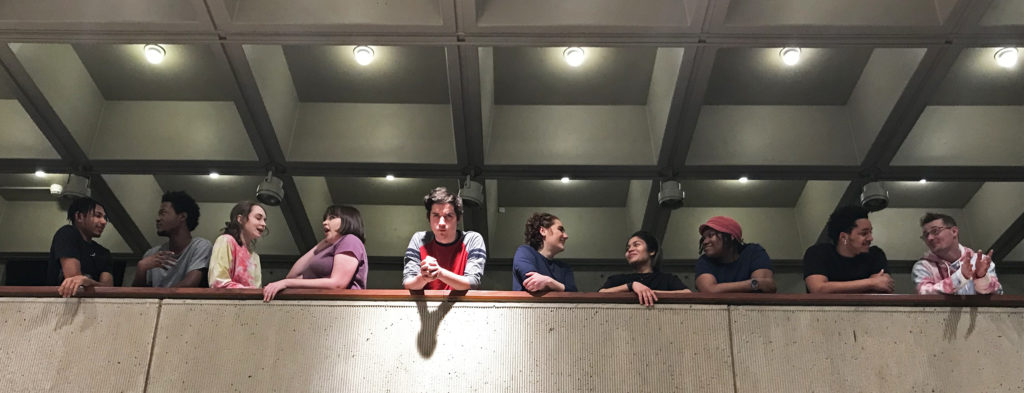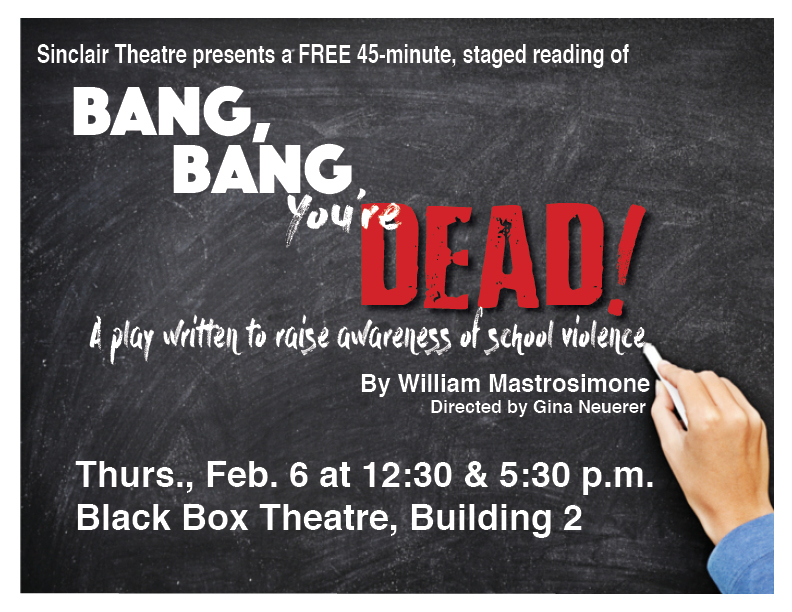I have been interested in the premise of “Bang, Bang You’re Dead!” since I first learned of it in early 2019. This was when Sinclair performed the play for a third time due to the one-year anniversary of the Parkland shooting. The plot centers around Josh, a mass shooter who takes the lives of several people: his ex-girlfriend, two former friends, two peers he did not know and his parents. But unfortunately, my class kept me from going to this showing.
This semester, I was pleasantly surprised to know that it was returning to Sinclair – for the fourth time! I still was not sure if I would be able to attend due to my schedule. Ultimately, things worked out in the end as viewing the play became a part of my Sociology class’s curriculum.
Attending this play marks the second time I have been in the Blackbox Theatre. The first being when I viewed “SLUT” by Katie Cappiello. It struck me how different the set-up of the theatre was for “Bang, Bang You’re Dead!” There were simple, leveled rows where seats were placed side by side. Grounded, it put you up close to the performance.
This was my first time watching a staged reading. I did not know how it would be to watch a play without props and limited movement, but – all and all, the experience was just as amazing as any other of the plays Sinclair puts on.
>>> For more events from the Theatre department <<< Click Here
While originally published in 1999, the dialogue was not too dated by today’s standards. While a few lines came across as awkward, for the most part, it was poignant and highly illustrative. This showcased the strength of the performance since there was so little to look at on stage.
Needless to say, complications arise when we speak of the perpetrators who commit mass shootings. Academics such as James Alan Fox, a Professor in criminology, argues that by extensively covering killers by exposing their writings and personal backgrounds, the media unnecessarily humanizes them.
Adam Lankford, another criminologist, asserts that shooters want to be treated like celebrities and therefore by revealing names and details of previous killers, the media is ultimately creating a space for another person to take their place in committing atrocities.
As someone who has been in multiple humanities classes, I have also heard these theories discussed in the classroom. Unfortunately, the mainstream masses are still interested in the psychology of the things that must happen to prompt a man to murder.
Are they lonely? Are they bullied? Do they enjoy video games? Are they mentally ill?
There are highly specific labels people place on shooters, which stereotype them as men that must fit a very specific criterion to become a killer. While it is said shooters do maintain certain recurring characteristics, the way that they choose to present themselves on the outside varies.
So over the course of an hour in a half, we familiarize ourselves with Josh. If you are the sort of viewer I am, then you try to understand the characters and furthermore assess them before deciding how you feel. Characterization is key to any excellent story.
There are things Josh tells us about himself, gradually. Beneath his highly cocky facade, he is insecure. He pines to ‘be a man,’ while a clear disconnection from his perspective of fantasy and reality lurks in the background. It is only when he realizes the severity of his crimes that he becomes horrified with himself.
Notable staples of his personality can be seen when his parents refuse to purchase him a rifle as they note that he has everything. For this reason, to hear Josh admit his true feelings fell flat. Early on, it is shown that he is manipulative, self-entitled and did not seem to be an outcast in life, so much as in his own warped reality.
An example of this would be when he says “You know me, I’m just a friendly guy,” to the ghost of Emily, a former childhood friend. Or, when the heartbreak he received from his girlfriend came from the fact she was upset he did not uphold his promise to take her to the movies.
This gives the impression that Josh’s dissatisfaction with his life stemmed from the fact he could not fully control it to his pleasure. As a result, I could not deem Josh a sympathetic character. But maybe that’s the brilliance of Sinclair’s point. Josh isn’t sympathetic.
Still, he was played brilliantly by Christopher Koehler. I watched in awe how Koehler would stand in position with minimal body language and minimal expression – then, with the backing of drums: he would roar, bellow, even punch with rage. He knew how to turn the anger off and on.
An actress who stood out to me was Katelyn Pennington, who portrayed Emily. Although there are a smaller number of scenes that portray their interaction (opposed to he and Katie, his former girlfriend) their dynamic stood out to me. Frequently, her ghost challenged Josh. Furious, she was determined to know why her old friend killed her – and if he enjoyed it.

I must say, the play had an excellent focus on the ghosts that haunt Josh. The ghosts voice their lost dreams and what they will miss about their life. They speak of families who also had a “bullet” pierced through their hearts with the loss they must endure.
The decision to incorporate the ghosts as major characters remains timely since the media presently strives to give a place to the victims at the forefront of reports.
I feel that “Bang, Bang You’re Dead!” is capable of generating discussion, whether it be about how you can stop someone from doing such a heinous crime or if it’s proper to humanize killers in 2020. But regardless, walking out of the theater, I felt grateful to have finally seen this play. Its direction was just so impactful on a multitude of levels.
Ayzha Middlebrooks
Associate Editor


